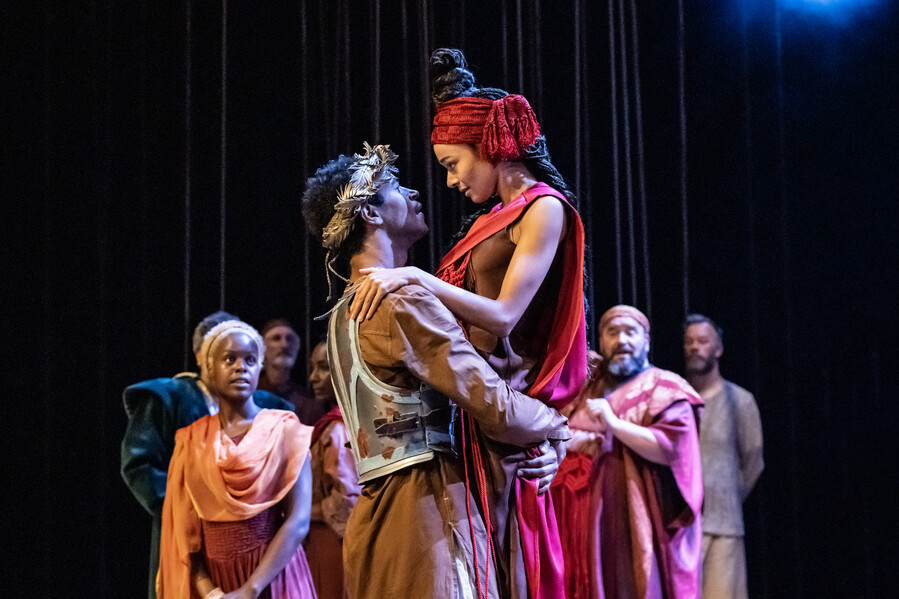
26 July – 21 September
Pericles is one of Shakespeare’s most problematic plays. Written in likely collaboration with George Wilkins, it was popular in its time, but has fallen into disfavour over the centuries, creeping back into the repertoire in recent years. It is a sprawling romance, with little of the psychological and emotional nuance of the great works in the canon. Good and evil stand in stark and simple contrast, and our human lives are seen to be at the mercy of forces we cannot control. Six separate locations and more than one shipwreck make it notoriously difficult to stage and it is a bold first choice for Tamara Harvey, the RSC’s new Co-Artistic Director. Nonetheless, by maintaining the simplicity of the storytelling and focusing on the miraculous heart of the play, she succeeds against all the odds.
An outline of the plot would extend for more than twice the expected length of this review, but the salient points are the quest for a wife by Prince Pericles, the subsequent loss of said wife and daughter, and the Prince’s travels to escape persecution and regain his kingdom. In the intervening years, we encounter an incestuous king and princess, a wicked foster mother, a bunch of pirates, a brothel keeper and her pimp, devotees of the goddess Diana, and many more. The narrative emerges not only through dialogue and action but also through a running chorus from the fourteenth century poet Gower, whose poem ‘Confessio Amantis’ was one of the sources of the Pericles story. One effective directorial innovation is the way the poet is transformed in the later scenes into the lost daughter Marina (a strong performance by Rachelle Diedericks) thus bringing a greater sense of agency to the principal female role.
This whirligig of place and action is presented on a bare stage beneath a series of heavy looped ropes. These drop down during storms at sea, seeming to entangle characters in the snakelike bands of fate as well as the tangled rigging of the ship. Lighting and changes of costume are effective without being showy. Movement director Annie-Lunnette Deakin- Foster has created a chorus like mood, apparently taking inspiration from Greek vase painting and eastern dance traditions, conjuring mythic shapes and tableaux, backed by rhythmic sound and music for percussion, wind and brass.
On an individual level there are many excellent performances with Alfred Enoch breathing life into the somewhat wooden figure of Pericles, with his anxiously twitching fingers and frightened eyes. At first, he appears both foolhardy and overwhelmed by forces beyond him, while at the end he rises to something like greatness in his expression of love, gratitude and humility.
Other characters bring individual touches of humanity to lesser roles, with Christian Patterson creating some welcome audience interaction as the hero’s father-in-law, Simonides, Leah Haile as Thaisa, maturing convincingly from eager young girl to dignified priestess and Felix Hayes, oozing lechery and duplicity as the evil king, Antiochus.
On reading Pericles for the second time before the show, it felt like a play whose time had passed. But despite its shortcomings in structure and language, this moving interpretation and the audience’s enthusiastic response suggest it may be as much a play for today as for the turbulent seventeenth century. We all long for a happy ending. And many of us will identify with earthly powerlessness and unpredictable gods.
★★★★☆ Ros Carne 8th August 2024
photographers credit @ Johan Persson


